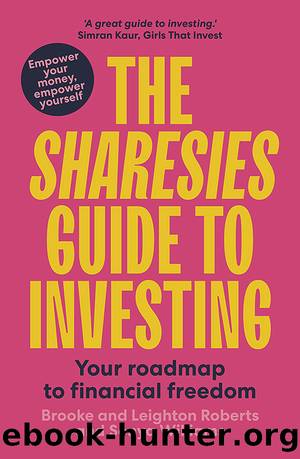The Sharesies Guide to Investing by Brooke Roberts & Leighton Roberts and Sonya Williams

Author:Brooke Roberts & Leighton Roberts and Sonya Williams
Language: eng
Format: epub
Publisher: Allen & Unwin
Published: 2022-12-13T00:00:00+00:00
Big developed economies
A developed economy is an economy where most of the basics are taken care of. Laws and contracts are enforced, so people can open businesses with more certainty. Important infrastructure like electricity is in place, and itâs reliable â when you flick the light switch, the lights go on, every time. People are generally well educated, so if you want to hire someone, you can rely on them having basic skills like reading and writing.
On top of this, some of the developed economies are really large. Think of places like the USA, Japan and Germany. Theyâre highly populated, and they produce really valuable goods and services that they sell to the whole world. The US is the worldâs biggest equity market by a significant margin â it is 56 per cent of the worldâs free-float market capitalisation11 (thatâs the total value of all shares on issue around the world). Japan, at 7.4 per cent, is a distant second.
Toyota Motor Corporation (NYSE:TM) is based in Japan. Toyota factories are worldwide, but whenever a car rolls off the line and gets sold, the profits flow back to Japan. Same goes for iPhones (US) and even Best Foods Mayonnaise (manufactured by Unilever plc NYSE:UL), a British/Dutch company).
The benefit of investing in these really big developed economies is that you get a piece of the richest companies in the world, with access to consumers who often have comparatively large amounts of disposable income to spend. Whatâs more, the big players in these economies sell things all over the world. This helps insulate them from local economic issues because thereâs money coming in from all over the place.
If thereâs a downturn in demand for Toyota cars in Japan, the company will probably be supported by ongoing orders from the United States or Europe.
Itâs relatively easy for investors in our part of the world to invest in these economies. As you already know, you can buy shares in lots of US companies through Sharesies, or other investing platforms. For example, an ETF like Vanguardâs Large Cap Index Fund (NYSEARCA:VV) will instantly put you into a basket of big-name US companies. Smartsharesâ Japan Equities ESG ETF (NZX:JPN) will put you in 300 companies in the Japanese market.
The potential downside in focusing on these big economies when it comes to investing is there can be less room for growth â youâre more likely to hear shares being described as âover-valuedâ in the bigger markets. People sometimes also complain that developed markets are âovercrowdedâ.
Download
This site does not store any files on its server. We only index and link to content provided by other sites. Please contact the content providers to delete copyright contents if any and email us, we'll remove relevant links or contents immediately.
Art of The Strategic Side Hustle: Simple Steps to Developing a Passive Income Side Hustle (The Strategic Series) by Hodge Kimberly(100)
An MBA in a Book by Xander Cansell(96)
The Art of Building Your Resilience and Adaptability by Néstor Gandara(82)
Pragmarketism by Arvind Bhandari(81)
Whole Numbers and Half Truths: What Data Can and Cannot Tell Us About Modern India by Rukmini S(68)
Under the Skin of the Indian Consumer by David Abikzir(63)
The Sharesies Guide to Investing by Brooke Roberts & Leighton Roberts and Sonya Williams(63)
Corporate Chanakya on Leadership by Radhakrishnan Pillai(61)
Aesthetic Labour by Warhurst Chris;Nickson Dennis; & Dennis Nickson(59)
Breakpoints by Mike Ashby(57)
Playing for Time by Jeremy Lewis(57)
IEC 61636-2-2023 (IEEE Std 1636.2) by IEC(54)
Dream Believe Create by Hayley Lewis(52)
Crisis Investing for the Rest of the '90s by Douglas Casey(51)
Non-Profit Legends for Humanity and Good Citizenship by Moore Hank;(51)
Case of the Bonsai Manager by R Gopalakrishnan(50)
IEC 61136-1-1992 scan by Unknown(48)
Fine Printing and Private Presses by Roderick Cave(46)
SMARTS: Are We Hardwired for Success? by CHUCK MARTIN PEG DAWSON AND RICHARD GUARE(39)
